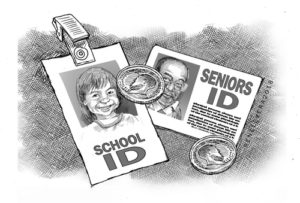Quite by accident, when I pulled out a folder from a stack of papers, the daughter’s ID slipped out.
She had this in Grade School.
Thanks to the lamination, it still had a shine, looking none the worse for the years.
I see in her thumb size photo the same smile that she now wears in adulthood, although the bangs have yielded to the long bob that befits a young lawyer.
In case you think I’m writing about hair styles, of which I know only the basics, having married someone with natural barbering skills, this piece really has to do with IDs, with which, to a man or woman, we are plagued.
I myself must have had downwards of fifteen of it, just a ballpark figure because
I’m too tired to reckon.
Enough to say that now the one I carry in my wallet is the Senior Citizen ID — mainly to get preferential treatment in lineups and discounts.
Why the current preoccupation with identity?
Perhaps because we have become too many and dishonest, the presumption being that, if given a chance, many of us would claim to be someone else to But supposing, at the entrance of a government office or private institution, a guard asks for my ID, but, instead of presenting it, I say, with earnestness and without arrogance, “Honestly now, tell me who I am?” If I have a name or status, he might tell the things he has heard and even give his assessment, good or bad, of me.
In the case of Jesus, people had known him to be a carpenter’s son, who preached with wisdom and authority and performed miracles, healing the sick and even bringing the dead back to life, and delivering the afflicted from demonic possession.
The Old Testament, over a span of 800 years, contains about 300 prophecies concerning the Messiah, most of them specific enough to apply to no one but Jesus.
But his disciples did not have an inkling of this, and we read in the Gospel of Mark that, when Jesus asked them who the people said he was, they answered, “John the Baptist, others Elijah, still others one of the prophets.”
But it was Peter, inspired by the Spirit, who declared Jesus’ real identity, “You are the Christ.”
It was suffering that marked out the Messiah, and Jesus himself, after he rose from the dead, when Thomas questioned his identity, showed him the wounds on his hands, feet and side.
Jesus himself had told the disciples that “the Son of Man must suffer greatly and be rejected by the elders, the chief priests, and the scribes, and be killed, and rise after three days.”
When Peter found this unacceptable, Jesus upbraided him, “Get behind me, Satan. You are thinking not as God does, but as human beings do.”
Without a doubt, it is in our attitude to suffering that we identify ourselves as true followers of Christ.
If in our every action we seek bodily pleasure and avoid pain, we belong to the class of beasts, said St. Augustine.
I’m not saying this in a patronizing way having experienced a little of suffering myself.
But, if for love of God and in unity with the Passion of Christ, we find value in pain and bear it with grace, the snapshot that God takes of us, joyful despite the hurt, forms part of the ID that we present when at the proper time an angel asks of us who we might be.
Disclaimer: The comments uploaded on this site do not necessarily represent or reflect the views of management and owner of Cebudailynews. We reserve the right to exclude comments that we deem to be inconsistent with our editorial standards.

